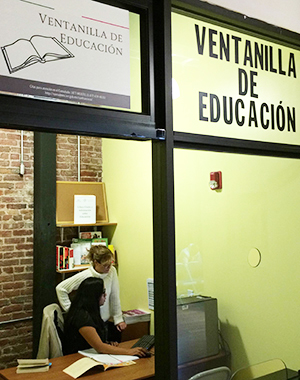At Mexican Consulate, SF State students make education happen
More than 300 people visit the Mexican Consulate in San Francisco on most days, and many of them spend as long as an hour waiting for paperwork to be processed. A volunteer program made up of San Francisco State University students has transformed this waiting time into a meaningful learning experience.

SF State student Saira Ramos (standing) and UC Berkeley student Erika Jaime (seated) volunteer to explain educational opportunities to Mexican nationals at its consulate.
At the Ventanilla de Educación, or the Window for Education help desk, Mexican nationals can receive information about education resources from student volunteers while they wait for official assistance. "It's bewildering to work your way through the U.S. system of educational services," said Teresa Carrillo, a professor in SF State's Latina/Latino Studies department, who recruits and trains volunteers for the program. "Growing up here and entering the public school system, we are used to the way things work. But for a Mexican national, especially an undocumented person, to have a close dealing with the state at any level is intimidating."
The Ventanilla de Educación -- inspired by a similar information desk devoted to health services -- launched in 2013 as a partnership between the Mexican Consulate, SF State and the University of California, Berkeley. After a successful pilot year, during which volunteers served thousands, the consulate will issue a memorandum of understanding with the schools on Oct. 23, establishing the program as a permanent fixture.
Each day, teams of bilingual students staff the help desk, prepared to introduce youth and adults to educational opportunities in the United States and Mexico. For example, students might explain the process of obtaining a high school equivalency certificate, discuss an online college-degree program run by a Mexican university, share information about scholarships or provide free Spanish-language textbooks. They might also sit at a computer with a parent and look over the website for their child's school, reviewing any ongoing activities or necessary paperwork.
Recent graduate Stephanie Suarez says her consulate work inspired a strong interest in education issues.
Stephanie Suarez, who graduated from SF State in May after volunteering during her final semester, said she could understand the needs of the people she served. "I know the struggle of Mexican people trying to make it in the U.S without the education or language skills. My parents have the same struggle," Suarez said. "I was able to represent what many want their kids to achieve."
SF State students are also able to discuss milestone American education legislation. To provide context for the services they describe, volunteers might explain that no child can legally be denied access to a public school education or that all children have a right to learn in a language they can understand.
"It makes a big difference to have a person inside an official place like the Mexican Consulate speaking to you in Spanish, saying that you have a right to educational services for your children here and that you have an obligation as a parent to seek them out," Carrillo remarked.
The Ventanilla de Educación program is integrated into SF State's Latina/Latino Studies curriculum as a part of the community-service learning component, a requirement for all majors. About 40 percent of the department's courses offer the option to receive class credit for volunteering, according to Carrillo. "Service learning is an important way of learning by example," she added. "When you major in Latino Studies, you become someone who is able to empower your community in a way others might not."
The students' efforts already have had major impacts, said Francisco Brito, coordinator for educational affairs at the Mexican Consulate. Recently, for instance, an undocumented 17-year-old who was not in school came in to obtain a passport. Volunteers approached the youth and explained how he could pursue a high-school diploma in the United States rather than just work.
"He got excited about it, and he realized that studying could allow him to apply for Deferred Action for Childhood Arrivals and lead to a work permit," Brito recalled. "Today he is enrolled in high school. That was a victory for us."
While SF State students are providing life-changing guidance to others, their work also leads to personal growth. "They feel for the first time in a real sense how their education makes them a resource for the community," Carrillo said.
That is certainly true of Stephanie Suarez, who now teaches at an elementary school with a majority Latino population and volunteers for two educational nonprofits. "I studied the history of the many struggles of the Latino community, but working with them in person, my books came to life. I wanted to do more, to research more, to be able to have more resources to help them out."
A press conference on the Ventanilla de Educación program will be held Thursday, Oct. 23, at 10:30 a.m. at the Mexican Consulate at 532 Folsom St. in San Francisco.
-- Beth Tagawa